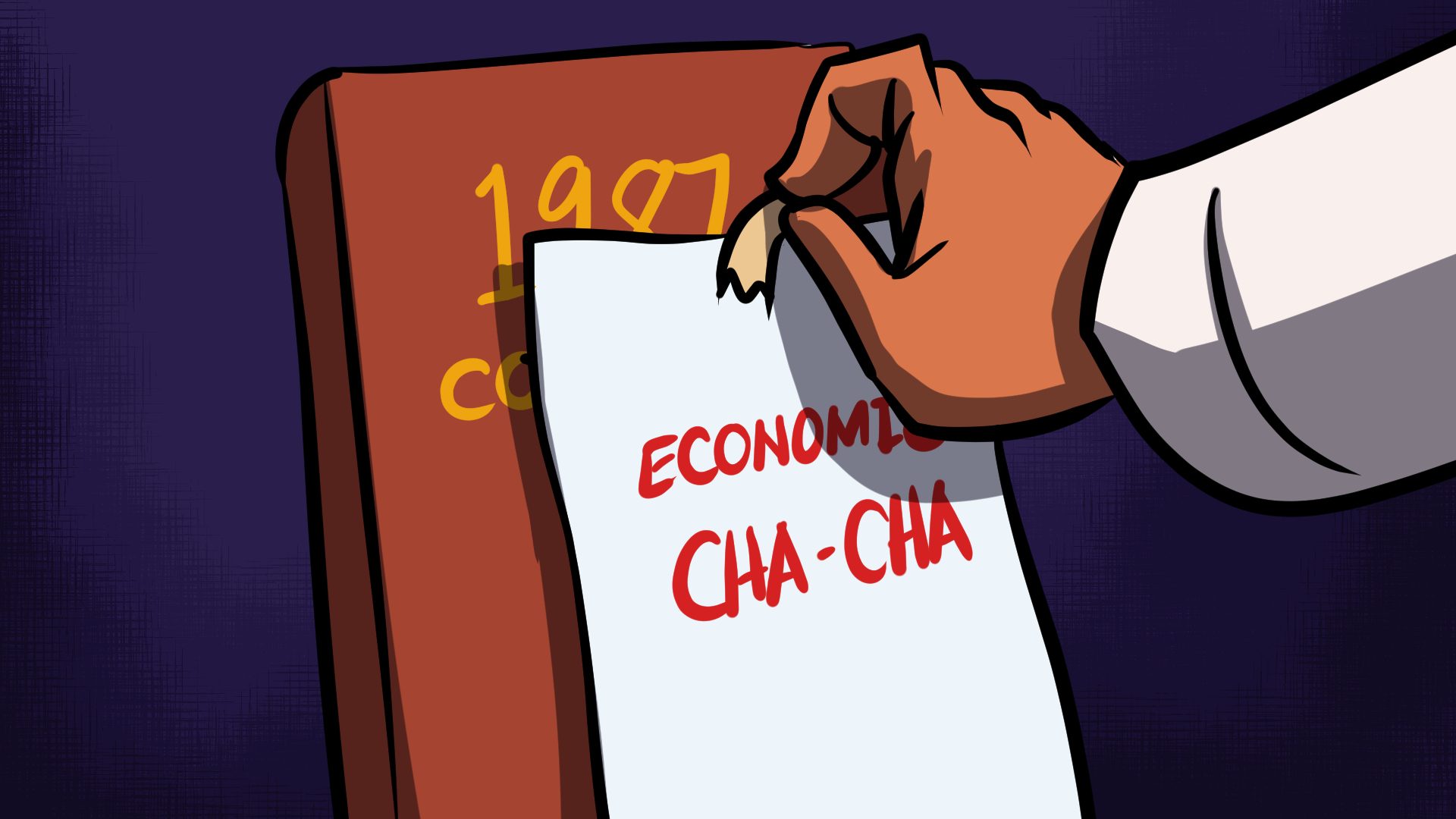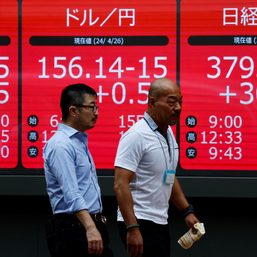SUMMARY
This is AI generated summarization, which may have errors. For context, always refer to the full article.

MANILA, Philippines – The Philippines must keep up with the “increasingly globalized age,” reads Resolution No. 6 filed by Senate President Juan Miguel “Migz” Zubiri on Monday, January 15, cementing the Marcos government’s push to propose amendments to the economic provisions of the Constitution.
Past attempts at economic charter change (Cha-Cha) have always been based on the argument that the Philippines must relax its rules on foreign ownership to be able to enjoy the benefits of a globalized world.
The Constitution limits foreign ownership in industries, 60% Filipino-40% foreign as a general rule, and absolutely no foreign ownership in mass media.
But several laws and regulations have been passed in recent years that already opened up the Philippine economy to the world without having to amend the Constitution.
There remain oppositions that some of these laws and regulations are unconstitutional for circumventing the limits. Still, the fact that they were passed, and without any Supreme Court decision to the contrary, they stand to be valid.
What are these?
- Public Service Act (PSA) – Enacted in March 2022, Republic Act (RA) 11659 distinguished between a public service and a public utility such that a public utility no longer includes telecommunication, shipping, airline, railway, toll road, and transport network vehicle industries. Because of the PSA, these industries are no longer subjected to the 40% constitutional limit on foreign ownership. Simply put, foreigners can now fully own corporations in these industries.
- Foreign Investment Act – Also enacted in March 2022, RA 11647 removed several industries from the “Foreign Investment Negative List,” or those where 100% foreign-owned companies cannot invest in. Simply, more industries, such as startups, startup enablers, enterprises with advanced technology, can have 100% foreign ownership.
- Retail Trade Liberalization Act – In January 2022, the 2000 Retail Trade Liberalization Act was amended so that foreign retailers are required a lower paid-up capital. Under the new RA 11595, a foreign retailer shall have a minimum P25 million paid-up capital. In the old law, the requirement used to be a minimum of the peso equivalent of US$2.5 million paid-up capital (in current exchange, that’s around P139 million).
- Renewable energy development – The Constitution also restricts to 40% the foreign ownership of a project to develop natural resources. But in 2022, the Department of Justice (DOJ) issued a legal opinion to the Department of Energy (DOE) that “natural resources” exclude kinetic energy like solar, wind, and hydro energy sources. Therefore, according to the DOJ opinion, renewable energy projects are not subjected to a 40% restriction cap, and are thus open to full foreign ownership.
- RCEP – RCEP is the Regional Comprehensive Economic Partnership, which the Philippines joined in February 2023. It is the largest trade pact in the world, and imposes minimal restrictions on trade. The opposition to RCEP is not so much constitutional as they are ideological. Some groups claimed that ASEAN members such as the Philippines will export less, and lose tariff revenues, whereas developed countries have higher protection.
What does Zubiri’s resolution want?
Proposed amendments in Zubiri’s Resolution of Both Houses No. 6 seem to back the Public Service Act (PSA). Remember that groups opposing the PSA said a law cannot allow what the Constitution does not permit. But under the proposed amendments, Section 11 of Article XII on public utilities will insert the clause “unless otherwise provided by law.” This will then give the constitutional greenlight, saying that if a law is passed to allow it, it will be valid.
The resolution also proposes the same clauses to the provisions on basic educational institutions and the advertising industry, so that there is also an opportunity to enact laws to lift or ease the cap on the 60-40% foreign restriction on the former, and the 70-30% on the latter.
If these laws and regulations were passed without Cha-Cha, the question is: what is the need for Cha-Cha at this point? – Rappler.com
Add a comment
How does this make you feel?

![[OPINION] A rebellion long overdue](https://www.rappler.com/tachyon/2024/06/mass-uprising-matrix-june-4-2024.jpg?resize=257%2C257&crop_strategy=attention)



![[Just Saying] SONA, Congress, accountability, and free speech](https://www.rappler.com/tachyon/2024/07/TL-SONA-congress-accountability-free-speech.jpg?resize=257%2C257&crop=330px%2C0px%2C1080px%2C1080px)
![[Just Saying] Reciting a hymn and pledge: Illegal, punitive, unconstitutional](https://www.rappler.com/tachyon/2024/06/20240612-reciting-hymn-pledge-unconstitutional.jpg?resize=257%2C257&crop=338px%2C0px%2C720px%2C720px)
![[Just Saying] Demonizing divorce and the mockery of our Constitution](https://www.rappler.com/tachyon/2024/06/TL-Demonizing-divorce-mocking-constitution-June-6-2024.jpg?resize=257%2C257&crop=265px%2C0px%2C720px%2C720px)
![[ANALYSIS] A Rube Goldberg cartoon of our inconvenient reality](https://www.rappler.com/tachyon/2024/05/tl-inconvenient-reality-05092024.jpg?resize=257%2C257&crop=280px%2C0px%2C720px%2C720px)
![[Vantage Point] Philippine economic reforms run into headwinds](https://www.rappler.com/tachyon/2024/05/ph-economic-headwind-may-2024.jpg?resize=257%2C257&crop_strategy=attention)
![[EDITORIAL] Apat na taon na lang Ginoong Marcos, ‘di na puwede ang papetiks-petiks](https://www.rappler.com/tachyon/2024/07/animated-bongbong-marcos-2024-sona-day-carousel.jpg?resize=257%2C257&crop=280px%2C0px%2C720px%2C720px)
![[In This Economy] Delulunomics: Kailan magiging upper-middle income country ang Pilipinas?](https://www.rappler.com/tachyon/2024/07/in-this-economy-upper-middle-income-country.jpg?resize=257%2C257&crop=421px%2C0px%2C1080px%2C1080px)

![[EDITORIAL] Marcos Year 2: Hilong-talilong](https://www.rappler.com/tachyon/2024/07/animated-bongbong-marcos-2nd-sona-carousel.jpg?resize=257%2C257&crop=136px%2C0px%2C720px%2C720px)
![[Newspoint] A fighting presence](https://www.rappler.com/tachyon/2024/07/thought-leaders-a-fighting-presence.jpg?resize=257%2C257&crop=441px%2C0px%2C1080px%2C1080px)
There are no comments yet. Add your comment to start the conversation.